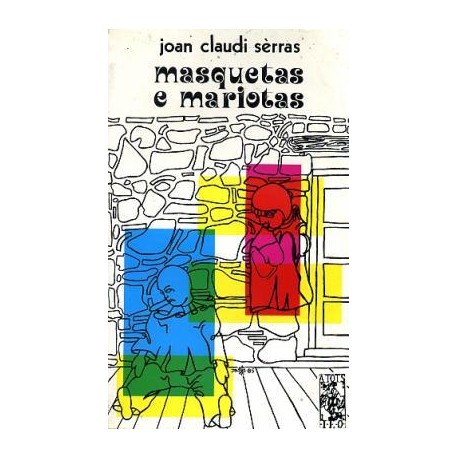A few days ago, I finished reading Enric Mouly's En Tutant lo grelh (1965). The last part of the book was slightly less interesting but it was still a good read. He touches briefly upon the rivalry and disagreements between the Grelh and the then newly-created Institut d'Estudis Occitans (IEO).
The Grelh was part of the Félibrige movement and thus seen as too folklorist, passeist, bourgeois by some young Occitanists in the post-war years. The IEO was created in 1945 and later became a major player. People like R. Lafont, M. Rouquette, J. Bodon, Y. Rouquette, J. Larzac (to name only a few) were generally more socially, politically engaged and wanted Occitan literature to become more radical, more experimental. They were very active and really gave a new impulse to Occitan literature and activism.
The two movements, Félibrige and IEO, still exist today and although things may have changed a bit over the years (with the IEO becoming less radical and disdainful of folklore), it seems to me that the differences are still there.
Then, I read Joan Claudi Sèrras's Masquetas e mariotas, a collection of fantastic and anticipation(?) short stories published in 1985. I really enjoyed some of these.
Here is the beginning of the first story:
Words jotted down for memorisation: a l'abroa, baldra/baudra, singlar, rebalar, galòi, ufanós, udolar, pivelar, trigossar, ponde.Dins mon païs se'n parleja totjorn entre las dents de la Felia, la filha des Estanhs...
Bèl temps a... Quant? O sabi pas dire, los autres tanpauc. Es la Loira – una menina qu'encara corrís, qu'es totjorn coma èra: un paqueton d'òsses enropat de negre – que la trobèt dins lo bòsc que ribeja l'Estanh Vièlh. Boscalhava coma cada jorn quand l'avisèt, aquela drolleta nusa que dormissiá nisada dins las falguièras. Es pas aisit d'aver mai de detalhs: la Loira es muda. E puèi tot lo mond n'a un pauc paur, e mai siá pas missanta, qu'es una armièra: lèva los sòrts e sap esfaçar jos las parpelhas los images que los cachavièlhas i an doblidat; n'i a tanben que van al seu ostal la nuèit de Totsants per far parlar los mòrts: pareis qu'aquela nuèit de la boca de la Loira sortís una votz rauca que te sanglaça. I soi pas jamai anat: ieu pensi que los mòrts, las trèvas, las paurs, los cal daissar en patz. Los vius tanben. Es per aquò que soi pas talament parlaire. Disi bonjorn, dubrissi los uèlhs e sosqui...
La drolleta, que portava dins son faudal, la Loira la prenguèt al seu ostal. La pichona ne sortiguèt pas d'un an. Degun anèt véser çò que li fasiá la Loira.
Un matin, la dròlla foguèt defòra: marchava en s'arrapant pels cotilhons de la vièlha. Èra polida, lo pèl rossèl, los uèlhs clars coma l'aiga, lo morre un bocinèl pigalhat, las cambas linjas jos un pelhòt blanc sens forma. D'aquel jorn se metèt a seguir la Loira de pertot, a l'òrt, dins lo bòsc, a la messa, sens daissar de tener los cotilhons de la vièlha.
Disiá pas res aquela nena: seriá muda coma la Loira? Pauruga de segur: quand qualqu'un s'aprochava, s'amagava la cara dins lo faudal de la Loira... (...)
In my village, people always whishper about Felia, the girl of the Ponds...
A long time ago... How long? I can't say, nor can the others. It's Loira – an old lady who still runs, who's still as she was: a small bundle of bones wrapped in black – who found her in the woods alongside the Old Pond. She was gathering old wood as she did every day, when she noticed her, this little girl, naked, sleeping among the ferns. It's not easy to learn more than that: Loira is mute. And also, everyone is a bit scared of her, even if she's not a bad person, because she's a witch: she removes curses and knows how to erase images nightmares leave under eyeslids; some also go at her place on All-Saints night to have dead people talk: it is said that on this night a hoarse voice comes out of Loira's mouth, a voice that makes your blood freeze. I never went there: me, I think that dead people, spectres, ghosts, they should be left in peace. Same for the living. That's why I not much of a talker. I say hello, I keep my eyes open and I ponder...
The little girl, carried in her apron, Loira took her into her house. The small girl didn't get out for a year. Nobody went to see what Loira was doing to her.
One morning, the girl was outside: she was walking, clutching to the old woman's dress. She was cute, redheaded, her eyes as clear as water, her face somewhat freckled, her legs slim under a small, shapeless white rag. From this day on, she started following Loira everywhere, into the garden, into the woods, to mass, without ever letting go of the old woman's dress.
She didn't say anything, this little girl: might she be mute like Loira? Fearful, that's for sure: when somebody would come close, she would hide her face in Loira's apron... (...)
